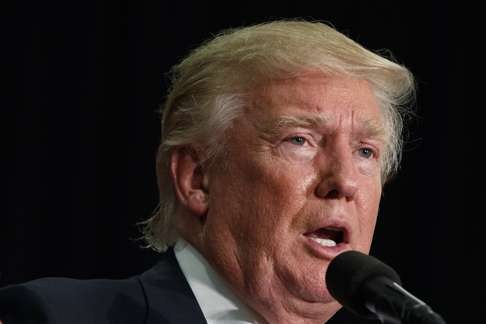
Welcome to Trump’s great new US-led world of low-value, blinkered protectionism
The Republican presidential nominee’s economic strategy is founded on the mistaken belief that his country’s revival from recession can be achieved by raising walls around US services

Look at the person next to you. Maybe they are fit and trim. Maybe they are a little bit flabbier than they should be. Perhaps they dress snappily. Perhaps they need a bit of fashion advice. Maybe they have a name. Almost certainly they are staring intently into their smartphone.
But from a biological point of view, they are all pretty much the same – around 60 per cent water.
Now look at that Mercedes you long to buy. Or that ridiculously priced Gucci handbag. Or that ripening durian you want to carry home for dinner.
What you see from an economic point of view is 60 per cent services.
In fact almost all of the difference in price between the Gucci bag and the fake one dangling in Temple Street market is services. It is the services that add the value. It is the services that account for most of the jobs involved in making it. And even more important, it is services that generate the high-paying and high-value adding jobs.
I thought about this now-well-established truth last week as I tried to discover the economic logic behind Donald Trump’s Detroit speech outlining his plans for reinvigorating the lackluster US economy.
His economic plan to “Make America Great Again” seems to hinge on reviving manufacturing and raising protectionist walls around the US – and I’m not talking only about the Mexican-funded wall along the USA’s southern border.
That is, of course, why he chose Detroit, the heartland of US car manufacturing, as the launch pad for his economic manifesto.
And the car workers and trade unionists concentrated in this economically challenged part of the US heartland rallied readily to his call: “(Trump) seems to realise that manufacturing creates wealth, it is an important thing for this country,” said one.

Sadly, neither those car workers nor Trump has identified the problem – nor an appropriate solution. Nor have his economic advisors, nor the millions of other anxious middle-class white men who have been brainwashed into rallying to Trump’s cause.
Excellent research undertaken over the past two years by Patrick Low and Gloria Pasadilla for APEC has demonstrated vividly how economic vitality is driven by services, even services at the heart of the manufacturing process.
In more than 30 cases drawn from across the Asia-Pacific region, their research demonstrated again and again that behind every manufactured good are literally dozens of productivity-enhancing services, and that it is these services that underpin whether a company is competitive or not.
Some of the services are performed unconsciously in-house. Others have been outsourced to create networks of interlinked services supply companies revolving around every successful large manufacturer.
From a Japanese mining and construction equipment company that has 74 separate services embedded in its manufacturing supply chain to a simple Chilean cherry farmer with 71 services needed to get his fruit to consumers in the US, the source of competitiveness is not your macho manufacturer, but fast, flexible service providers.
Get the service infrastructure wrong, and you have a Malaysian Proton. Get it right and you have a Japanese Lexus or an American Tesla.
It is services that ensure the quality of the product, underpin brand reputation, and justify the huge difference in price.
I know Donald Trump despises just about anything Chinese, but he would do well to look at what has been happening inside Chinese manufacturing of late
I know Donald Trump despises just about anything Chinese, but he would do well to look at what has been happening inside Chinese manufacturing of late.
It only took the opening up of the global iPhone supply chain to make them realise they were playing a manufacturing mug’s game.
Foxcon’s 800,000-odd mainland workers may boast a monopoly on the supply of millions of svelt new iPhones every year, but when officials discovered that China captured just US$7 of the US$500 value of an iPhone, locking hundreds of thousands of dormitory-based workers in permanent poverty, they quickly changed tack: they began asking “Where along the value chain are the high-value-adding activities, and how can we attract them?”
Of course, most of these high-value-adding activities are services in one form or another, and so that is where efforts are being focused to enhance productivity, protect competitiveness, and generate jobs that add more value and pay better salaries.
Their riposte to Trump would be simple: if you want those manufacturing jobs back, have them. Lock your manufacturing workers in low-wage poverty if you want. If you think that will make American great again, dream on.
The other plank of Trump’s economic manifesto seems to be protection – renegotiating trade deals right back to the North American Free Trade Agreement, or Nafta.
The craziness of this strategy is so blindingly obvious, I am staggered Trump has managed to gather any credible economists around him to fight his cause.
Demands to renegotiate completed trade agreements – right up to the freshly-minted Trans-Pacific Partnership – would be pilloried worldwide as flagrant bad faith, hugely damaging American’s reputation
Wherever you look worldwide, high protectionist walls lead to flabby and uncompetitive monopoly franchises at home. The economies with highest levels of competitiveness, productivity and efficiency are economies uncossetted by tariff barriers and other non-tariff barriers.
Demands to renegotiate completed trade agreements – right up to the freshly-minted Trans-Pacific Partnership (TPP) – would be pilloried worldwide as flagrant bad faith, hugely damaging American’s reputation in the World Trade Organisation, and in a wide range of other globally binding agreements.
Trump is also dreaming if he thinks he could miraculously negotiate better deals ten years into the worst global recession in a century, with leaders across the world tempted by local lobbies to raise protectionist walls.
Trump would unlock a Pandora’s Box that will lead to years of frustration, uncertainty and prodigious litigation. Great for armies of lawyers. Terrible for businesses that value a clear, transparent and stable world trading framework.
It is frustrating to see so many stressed American workers seduced by such simplistic and mistaken illusions. It is even more frustrating to see Trump as the Pied Piper herding so many down a blind alley that will lead to immiseration, not recovery.
Like most humans, Trump is 60 per cent water, but from an economic point of view most of the remaining 40 per cent seems to be hot air.
David Dodwell is executive director of the Hong Kong-Apec Trade Policy Group